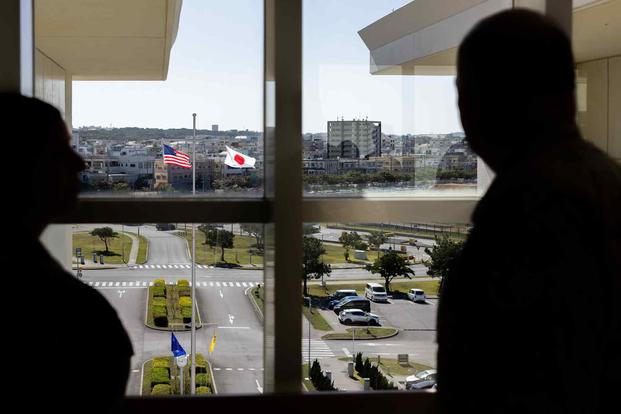The US Is Investigating an Unauthorized Release of Classified Documents on Israel's Attack Plans

WASHINGTON (AP) — The United States is investigating an unauthorized release of classified documents[1] that assess Israel's plans to attack Iran[2], three U.S. officials told The Associated Press. A fourth U.S. official said the documents appear to be legitimate.
The documents are attributed to the U.S. Geospatial Intelligence Agency and National Security Agency, and note that Israel was still moving military assets in place to conduct a military strike in response to Iran's blistering ballistic missile attack[3] on Oct. 1. They were sharable within the “Five Eyes,” which are the U.S., Great Britain, Canada, New Zealand and Australia.
The documents, which are marked top secret, were posted to the Telegram messaging app and first reported by CNN and Axios. The officials spoke on the condition of anonymity because they were not authorized to discuss the matter publicly.
The investigation is also examining how the documents were obtained — including whether it was an intentional leak by a member of the U.S. intelligence community or obtained by another method, like a hack — and whether any other intelligence information was compromised, one of the officials said. As part of that investigation, officials are working to determine who had access to the documents before they were posted, the official said.
The U.S. has urged Israel to take advantage of its elimination of Hamas leader Yahya Sinwar[4] and press for a cease-fire in Gaza, and has likewise urgently cautioned Israel not to further expand military operations in the north in Lebanon[5] and risk a wider regional war. However, Israel's leadership has repeatedly stressed it will not let Iran's missile attack go unanswered.
In a statement, the Pentagon said it was aware of the reports of the documents but did not have further comment.
The Israeli military did not immediately respond to a request for comment over the leak of the two documents.
The documents first appeared online Friday via a channel on Telegram, claiming they had been leaked by someone in the U.S. intelligence community, then later the U.S. Defense Department. The information appeared entirely gathered through the use of satellite image analysis.
One of the two documents resembled the style of other material from the U.S. National Geospatial Intelligence Agency leaked by Jack Teixeira[6], an Air National Guardsman who pleaded guilty in March[7] to leaking highly classified military documents about Russia’s war on Ukraine and other national security secrets.
The Telegram channel involved in the leak identifies itself as being based in Tehran, Iran's capital. It previously published memes featuring Iran’s Supreme Leader Ayatollah Ali Khamenei and material in support of Tehran’s self-described “Axis of Resistance,” which includes Middle East militant groups armed by the Islamic Republic.
___
Associated Press writer Jon Gambrell in Jerusalem contributed.
© Copyright 2024 Associated Press. All rights reserved. This material may not be published, broadcast, rewritten or redistributed.
Jeff Bridges, 'The Dude' in the Film 'The Big Lebowski,' Was in the Coast Guard > U.S. Department of Defense > Story
 Actor Jeff Bridges, aka "The Dude" in director Joel Coen's film "The Big Lebowski," served in the Coast Guard Reserve from 1967 to 1975 as a boatswain's mate, attaining the rank of petty officer 2nd class when he separated from the service.
Botswain's
Actor Jeff Bridges, aka "The Dude" in director Joel Coen's film "The Big Lebowski," served in the Coast Guard Reserve from 1967 to 1975 as a boatswain's mate, attaining the rank of petty officer 2nd class when he separated from the service.
Botswain's DoD Launches Program to Help Employees Who Have Had Trouble Getting Health Care in Japan

The Defense Department is rolling out a new pilot program to help civilian employees in Japan access medical care, and while it may remove some of the process's roadblocks, advocates say additional improvements are needed.
The Pilot Health Insurance Enhancement program, announced earlier this month, will be available at no cost to employees enrolled in a participating Federal Employees Health Benefits programs and non-appropriated fund employees who have an Aetna International plan.
The $4.2 million, nine-month contract with International SOS Government Services Inc., Tricare's overseas contract manager, will provide a 24-hour-a-day call center manned by bilingual staff to help callers find providers, make appointments and receive upfront payment guarantees starting Jan. 1, according to a DoD release Oct. 7[1].
Read Next: Pentagon Discloses 21 Allegations of Sexual Misconduct in JROTC As It Outlines Reforms to Congress[2]
"In keeping with Secretary of Defense Lloyd J. Austin III's commitment to taking care of all our people, we owe it to our civilians to facilitate access to health care no matter where they are," Ashish Vazirani, acting undersecretary of defense for personnel and readiness, said in a statement.
Civilian DoD employees and their dependents have faced troubles getting health care in Japan since at least 2022, when the Defense Health Agency announced it would only provide treatment in military hospitals and clinics on a space-available basis.
After receiving pushback, the DHA later changed its policy, saying civilians could continue getting treatment at military hospitals for chronic conditions but would have to go to Japanese providers for acute care.
Last November, DHA Director Lt. Gen. Telita Crosland promised reforms by the end of 2024 that would address the problems. The pilot is the result of this yearlong effort, according to the Defense Department.
"The support from this pilot program will help enhance the patient experience for the approximately 11,000 civilians stationed in Japan through the new pilot," Vazirani said.
Advocates say they have concerns that the program covers employees only and not dependents, a "serious shortcoming," according to Japan Civilian Medical Advocacy, a grassroots group made up of affected employees and dependents.
It also does not appear to include contractors or those assigned to Japan on temporary duty, according to the group.
Randi Wilson, a civilian Defense Department employee and JCMA member, said she has additional concerns about the program's effectiveness, given that agreements already exist between DoD and International SOS that provide similar services.
On the upside, she said, the program would help those who don't speak Japanese to navigate the country’s health-care system and make appointments.
However, it won't help facilitate emergency care, does not prevent denial of care (Japanese facilities aren't required to accept patients, even in life-threatening emergencies) and does not address the need for improvement of military health facilities in Japan, Wilson told Military.com in an email.
"This program missed the mark. It doesn't solve the big problems that continue to unnecessarily endanger the total force in Japan; I'm talking preventable deaths, preventable disabilities, preventable child development issues and more happening to military and civilian personnel alike," Wilson said.
From 2022 through January 2024, at least 24 service members, civilian DoD employees or military dependents were turned away for emergency medical care [3]from Japanese hospitals and four died, including the 7-year-old daughter of a U.S. Marine and a civilian employee who suffered a heart attack and was denied care at 10 facilities before he died.
In March, a bipartisan group of lawmakers wrote Crosland and Assistant Secretary of Defense for Health Affairs Dr. Lester Martinez Lopez, pressing for improvements to medical care [4]for military personnel, civilians and families in Japan.
"We appreciate the steps that DHA and INDOPACOM [U.S. Indo-Pacific Command] are taking to address these issues. But we continue to be concerned by reports of problems accessing care, and its impact on morale and retention," wrote Democratic Sens. Elizabeth Warren of Massachusetts and Tim Kaine of Virginia, and Rep. Michael Burgess, R-Texas.
Wilson said she hoped DoD, after a year of deliberation, would commit to improving the military treatment facilities in Japan. She also would like the Pentagon to inform civilian employees and military personnel of the country's limitations to emergency and mental health services, remove state licensing restrictions to enable access to telehealth and enact hiring reform to hire spouses[5] who are health-care professionals.
“After more than a year of deliberation, dozens of denied emergency cases and deaths, and hundreds of denials of care, why is this program the only result? Why haven’t we seen less costly and more impactful steps?” Wilson asked.
The pilot will run through Sept. 29, 2025. The DHA plans to announce more details about the program before the start of open season for federal benefits enrollment. Open season is scheduled this year from Nov. 11 to Dec. 9.
Related: Staffing Shortages Hit Naval Hospital Okinawa, Causing Chaos for Expecting Moms[6]
© Copyright 2024 Military.com. All rights reserved. This article may not be republished, rebroadcast, rewritten or otherwise distributed without written permission. To reprint or license this article or any content from Military.com, please submit your request here[7].